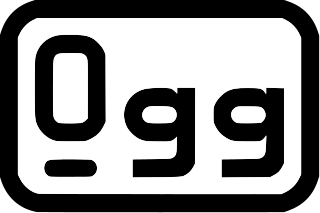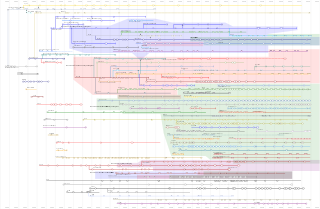Related Research Articles
Adobe Flash is a discontinued multimedia software platform used for production of animations, rich internet applications, desktop applications, mobile apps, mobile games, and embedded web browser video players.

Ogg is a free, open container format maintained by the Xiph.Org Foundation. The authors of the Ogg format state that it is unrestricted by software patents and is designed to provide for efficient streaming and manipulation of high-quality digital multimedia. Its name is derived from "ogging", jargon from the computer game Netrek.

Vorbis is a free and open-source software project headed by the Xiph.Org Foundation. The project produces an audio coding format and software reference encoder/decoder (codec) for lossy audio compression, libvorbis. Vorbis is most commonly used in conjunction with the Ogg container format and it is therefore often referred to as Ogg Vorbis.
Theora is a free lossy video compression format. It was developed by the Xiph.Org Foundation and distributed without licensing fees alongside their other free and open media projects, including the Vorbis audio format and the Ogg container.

Mozilla Firefox, or simply Firefox, is a free and open source web browser developed by the Mozilla Foundation and its subsidiary, the Mozilla Corporation. It uses the Gecko rendering engine to display web pages, which implements current and anticipated web standards. Firefox is available for Windows 10 and later versions of Windows, macOS, and Linux. Its unofficial ports are available for various Unix and Unix-like operating systems, including FreeBSD, OpenBSD, NetBSD, and other platforms. It is also available for Android and iOS. However, as with all other iOS web browsers, the iOS version uses the WebKit layout engine instead of Gecko due to platform requirements. An optimized version is also available on the Amazon Fire TV as one of the two main browsers available with Amazon's Silk Browser.
Xiph.Org Foundation is a nonprofit organization that produces free multimedia formats and software tools. It focuses on the Ogg family of formats, the most successful of which has been Vorbis, an open and freely licensed audio format and codec designed to compete with the patented WMA, MP3 and AAC. As of 2013, development work was focused on Daala, an open and patent-free video format and codec designed to compete with VP9 and the patented High Efficiency Video Coding.

A browser war is a competition for dominance in the usage share of web browsers. The "first browser war" (1995–2001) consisted of Internet Explorer and Netscape Navigator, and the "second browser war" (2004-2017) between Internet Explorer, Firefox, and Google Chrome.

VLC media player is a free and open-source, portable, cross-platform media player software and streaming media server developed by the VideoLAN project. VLC is available for desktop operating systems and mobile platforms, such as Android, iOS and iPadOS. VLC is also available on digital distribution platforms such as Apple's App Store, Google Play, and Microsoft Store.
The following comparison of video players compares general and technical information for notable software media player programs.

SeaMonkey is a free and open-source Internet suite. It is the continuation of the former Mozilla Application Suite, based on the same source code, which itself grew out of Netscape Communicator and formed the base of Netscape 6 and Netscape 7.

The Mozilla Application Suite is a discontinued cross-platform integrated Internet suite. Its development was initiated by Netscape Communications Corporation, before their acquisition by AOL. It was based on the source code of Netscape Communicator. The development was spearheaded by the Mozilla Organization from 1998 to 2003, and by the Mozilla Foundation from 2003 to 2006.
Miro was an audio, video player and Internet television application developed by the Participatory Culture Foundation. It runs on Microsoft Windows, macOS, FreeBSD and Linux and supports most known video file formats. It offers both audio and video, some in HD quality.

Microsoft Silverlight is a discontinued application framework designed for writing and running rich internet applications, similar to Adobe's runtime, Adobe Flash. While early versions of Silverlight focused on streaming media, later versions supported multimedia, graphics, and animation, and gave support to developers for CLI languages and development tools. Silverlight was one of the two application development platforms for Windows Phone, but web pages using Silverlight did not run on the Windows Phone or Windows Mobile versions of Internet Explorer, as there was no Silverlight plugin for Internet Explorer on those platforms.
The HTML5 draft specification adds video and audio elements for embedding video and audio in HTML documents. The specification had formerly recommended support for playback of Theora video and Vorbis audio encapsulated in Ogg containers to provide for easier distribution of audio and video over the internet by using open standards, but the recommendation was soon after dropped.
HTML video is a subject of the HTML specification as the standard way of playing video via the web. Introduced in HTML5, it is designed to partially replace the object element and the previous de facto standard of using the proprietary Adobe Flash plugin, though early adoption was hampered by lack of agreement as to which video coding formats and audio coding formats should be supported in web browsers. As of 2020, HTML video is the only widely supported video playback technology in modern browsers, with the Flash plugin being phased out.
HTML audio is a subject of the HTML specification, incorporating audio input, playback, and synthesis, as well as speech to text, all in the browser.
Mozilla is a free software community founded in 1998 by members of Netscape. The Mozilla community uses, develops, publishes and supports Mozilla products, thereby promoting exclusively free software and open standards, with only minor exceptions. The community is supported institutionally by the non-profit Mozilla Foundation and its tax-paying subsidiary, the Mozilla Corporation.
Daala is a video coding format under development by the Xiph.Org Foundation under the lead of Timothy B. Terriberry mainly sponsored by the Mozilla Corporation. Like Theora and Opus, Daala is available free of any royalties and its reference implementation is being developed as free and open-source software. The name is taken from the fictional character of Admiral Natasi Daala from the Star Wars universe.
Amara, formerly known as Universal Subtitles, is a web-based non-profit project created by the Participatory Culture Foundation that hosts and allows user-subtitled video to be accessed and created. Users upload video through many major video hosting websites such as YouTube, Vimeo, and Ustream to subtitle.
References
- 1 2 3 4 Anderson, Mark (December 10, 2005). "Internet TV at a crucial fork in the road". New Scientist . ProQuest 200394121 . Retrieved September 20, 2024– via ProQuest.
- ↑ "Democracy Internet TV Blog: Announcing Miro". Archived from the original on September 27, 2007. Retrieved August 1, 2007.
- ↑ Dibbell, Julian (March 8, 2006). "Mediocre TV". The Village Voice . ProQuest 232289502 . Retrieved September 20, 2024– via ProQuest.
- ↑ "Our mission is tied to the structure of our organization". Participatory Culture Foundation. Retrieved September 20, 2024.
- ↑ "About Page, Participatory Culture Foundation website" . Retrieved August 1, 2007.
- ↑ Gonsalves, Antone (September 12, 2005). "Really, Web Video Is For Real". InformationWeek . ProQuest 229167954 . Retrieved September 20, 2024– via ProQuest.
- ↑ "about PCF". Participatory Culture Foundation. Retrieved October 1, 2024.
- 1 2 Cohen, Adam (June 14, 2006). "Could a 15-Year-Old With a Laptop Be the New Campaign Media Guru?". The New York Times . ProQuest 433360321 . Retrieved September 20, 2024– via ProQuest.
- ↑ "Seth's Mozilla Blog". 2007. Archived from the original on June 23, 2007. Retrieved June 28, 2007.
- ↑ Spina, Carli (April 2021). "Chapter 6. Video Accessibility Tools". Library Technology Reports. 57 (3): 25–27. ProQuest 2520093115 – via ProQuest.